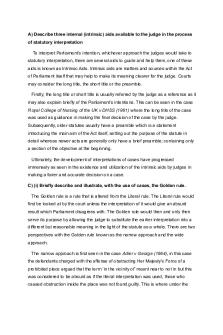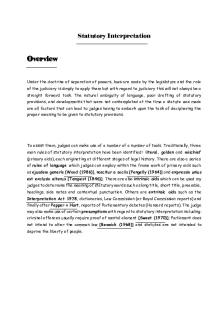LAWS1201 Statutory Interpretation Summary PDF

| Title | LAWS1201 Statutory Interpretation Summary |
|---|---|
| Author | Ella Carmichael |
| Course | Foundations of Australian Law |
| Institution | Australian National University |
| Pages | 8 |
| File Size | 180.9 KB |
| File Type | |
| Total Downloads | 28 |
| Total Views | 134 |
Summary
Download LAWS1201 Statutory Interpretation Summary PDF
Description
1. CONTEXTUAL APPROACH
Read words for their ordinary meaning
-
‘[T]he modern approach to statutory interpretation ... insists that the context be considered in the first instance’ - CIC Insurance Ltd v Bankstown Football Club (Project Blue Sky)
Definitions in the Act itself
-
Open Definition: ‘includes’
-
Closed Definition: ‘means’
Acts Interpretation Act
-
Definitions: S2B
-
Months: S2G
-
Gender and Number: S23
-
Examples: S15AD
-
Material Part of an Act: S13
Dictionary, Technical and Legal Meanings
-
Using an English Dictionary: State Chamber of Commerce v Commonwealth
-
Legal Meanings: Fisher v Bell
Maxims of Interpretation
-
When not to use Maxims: inconsistency, injustice, absurdity, against the purpose. o
Deren v Wiscengrund
-
Maxims are ‘useful servants but dangerous masters’ o
-
Noscitur a sociis: ‘The meaning of a word is known from the words that accompany it.’ o
-
Colquhoun v Brooks
R v Ann Harris (1836)
Ejusdem Generis: ‘If words of particular meaning are followed by general words, the general words are limited to the same kind as the particular words.’ o
-
Deputy Commissioner of Taxation v Clark
Expressio Unius est Exclusio Alterius: ‘Express mention of one thing is the exclusion of another.’ o
Colquhoun v Brooks
o
'Generalia Specialibus non derogant': 'General things do not derogate from special things'
-
Consistent use of words is assumed: o
‘When the same word is given different meanings it ‘should be clear and apparent’ Wilson v Commissioner of Stamp Duties (Lee J)
-
All words are assumed to carry meaning: o
It is 'A known rule in the interpretation of Statutes that such a sense is to be made upon the whole as that no clause, sentence, or word shall prove superfluous, void or insignificant' -Commonwealth v Baume (1905) citing R v Berchet (1688)
Common Law References
CIC Insurance Ltd v Bankstown Football Club (1997) 187 CLR 384 (Project Blue Sky)
State Chamber of Commerce v Commonwealth (1987) 163 CLR
Fisher v Bell [1961] 1 QB 394
Deren v Wiscengrund
R v Ann Harris (1836)
Deputy Commissioner of Taxation v Clark
Colquhoun v Brooks
2. PURPOSIVE APPROACH
Acts Interpretation Act 1901 Section 15AA
‘In interpreting a provision of an Act, the interpretation that would best achieve the purpose or the object of the Act (Whether or not that purpose or object is expressly stated in the Act) is to be preferred to each other interpretation.’
Relation to Common Law
-
CIC Insurance Ltd v Bankstown Football Club (Project Blue Sky)
Limitations on the Purposive Approach
-
‘[T]he task is to construe an Act, not to rewrite it, in the light of its purposes’ Mills v Meeking (n25) 235 (Dawson J)
-
'[T]he requirement s 15AA (1)… is not a warrant for redrafting legislation nearer to an assumed desire of the legislature.' R v L (1994) 49 FCR 534
-
Too great a departure 'may violate the separation of powers in the constitution.' (549 [40]) Taylor v Owners- Strata Plan No 11564
Drafting Errors and Oversights
-
Only in certain conditions that the reading in of missing words could be a legitimate use of the purposive approach: o
'First the court must know the mischief with which the Act was dealing. Secondly, the court must be satisfied that by inadvertence Parliament has overlooked an eventuality which must be dealt with if the purpose of the Act is to be achieved. Thirdly, the court must be able to state with certainty what words the Parliament would have used.' (105-6) Birmingham v Corrective Services Commission of New South Whales (1988) 15 NSWLR 292, McHugh JA
-
'Construction must be text based' R v Young (1999) 46 NSWLR 681 Spigelman CJ
-
'The question whether the court is justified in reading a statutory provision as if it contained additional…or omitted words involves a judgement of matters of degree.' Taylor v OwnersStrata Plan No 11564 (2013) 83 NSWLR 1.
3. EXTRINSIC MATERIALS
Acts Interpretation Act 1901 Section 15AB
-
15AB(2): List of extrinsic materials that are permissible to use in interpretation.
-
15AB(1): Provides a set of three limited circumstances when it is permissible to access extrinsic materials to determine meaning.
Extrinsic Materials: Documentary Materials that exist outside the statute being interpreted.
o
Second Reading Speeches
o
Explanatory Memorandum
When to use Extrinsic Materials
-
S15AB(1)(a): To confirm the meaning that you already have.
-
S15AB(1)(b)(i): To determine the meaning of an ‘ambiguous or obscure’ provision.
-
S15Ab(1)(b)(ii): To determine the meaning if the ordinary meaning ‘leads to a result that is manifestly absurd or is unreasonable.’
Application at Common Law
-
‘Section 15AB… Permits consideration of extrinsic material in interpretation of an Act if the provision is ambiguous or obscure or if the ordinary meaning is manifestly absurd or unreasonable.’ [579] Re Shingles and Director- General of Social Security (1984) 6 ALD 586.
-
The courts recognise extrinsic materials as part of the context approach in its ‘widest sense’ CIC Insurance
-
“it is erroneous to look at extrinsic materials before exhausting the application of the ordinary rules of statutory interpretation” - Saeed v Minister for Immigration and Citizenship
-
A matter of timing – Certain Lloyd’s Underwriters v Cross. o
‘The starting point for this process of construction is the words of the provision in question read in the context of the statute.’ [88] Justice Keiffel.
4. PRESUMPTIONS
-
All presumptions can be overcome by statutory language to the contrary.
-
The stronger the presumption, the clearer the statutory language needs to be in order to overcome the presumption.
-
Presumptions are often considered useful to a contextual analysis.
Presumption that Parliament does not Interfere with Fundamental Rights
-
Legislation cannot overthrow or infringe upon common law principles/rights unless it expressly says that it is doing so in ‘unmistakeable and unambiguous language’. - Coco v The Queen
-
Coco v The Queen (1994) 179 CLR 427: Common law right against trespass.
-
AI Kateb: Right to personal Liberty
Presumption Against Retrospectivity
-
Should be considered at the beginning of interpretation.
-
'The rule at common law is that a statute ought not to be given a retrospective operation where to do so would affect an existing right or obligation' – Rodway v The Queen (1990) 169 CLR 515
-
'There is no presumption against retrospectivity in the case of statutes which affect mere matters of procedure.' – Rodway v The Queen
Presumption that re-enactment constitutes approval of interpretation
-
Where the parliament uses a word or phrase that has been previously interpreted by the judiciary it is assumed that the parliamentary drafters know about and accept the previous interpretation of the word/phrase.
-
Flaherty v Girgis
Presumption that Penal Provisions are Strictly Construed in Favour of the Accused
-
Courts are reluctant to interpret statutes as to deprive someone of their liberty by imprisoning them if there is a lack of clarity.
-
‘Strictly Construed’: a narrower interpretation.
-
Beckwith v The Queen
Presumption that Property Rights are not Taken Away without Compensation
-
Being a Constitutional requirement, this presumption cannot be revoked by legislation alone.
-
The Constitution Section 51xxxiii: Acquisition of property by the commonwealth must be ‘on just terms .’
Acts Interpretation Act 1901 Sections 2, 2B, 2C, 3, 3A, 13, 15AA, 15AB, 23
Q 1 (b) AIA s 2B
Q 2 (a) AIA s 2B
Q 2 (b) AIA s 2B (and also, s 19A and s 19B)
Q 2 (c ) AIA s 2B...
Similar Free PDFs

Statutory Interpretation
- 6 Pages

Statutory Interpretation
- 6 Pages

Statutory Interpretation
- 3 Pages

Statutory Interpretation
- 5 Pages

Statutory Interpretation
- 11 Pages

Statutory Interpretation
- 6 Pages

Statutory interpretation notes
- 2 Pages

Statutory Interpretation 70102
- 5 Pages

Statutory Interpretation in Malaysia
- 12 Pages

Statutory Interpretation Notes
- 9 Pages

Statutory Interpretation Notes
- 4 Pages
Popular Institutions
- Tinajero National High School - Annex
- Politeknik Caltex Riau
- Yokohama City University
- SGT University
- University of Al-Qadisiyah
- Divine Word College of Vigan
- Techniek College Rotterdam
- Universidade de Santiago
- Universiti Teknologi MARA Cawangan Johor Kampus Pasir Gudang
- Poltekkes Kemenkes Yogyakarta
- Baguio City National High School
- Colegio san marcos
- preparatoria uno
- Centro de Bachillerato Tecnológico Industrial y de Servicios No. 107
- Dalian Maritime University
- Quang Trung Secondary School
- Colegio Tecnológico en Informática
- Corporación Regional de Educación Superior
- Grupo CEDVA
- Dar Al Uloom University
- Centro de Estudios Preuniversitarios de la Universidad Nacional de Ingeniería
- 上智大学
- Aakash International School, Nuna Majara
- San Felipe Neri Catholic School
- Kang Chiao International School - New Taipei City
- Misamis Occidental National High School
- Institución Educativa Escuela Normal Juan Ladrilleros
- Kolehiyo ng Pantukan
- Batanes State College
- Instituto Continental
- Sekolah Menengah Kejuruan Kesehatan Kaltara (Tarakan)
- Colegio de La Inmaculada Concepcion - Cebu




